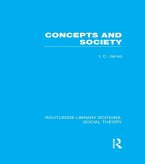The concept of industrial society plays a dominant role in the social sciences. The 'Great Divide' between pre-industrial and industrial societies is commonly assumed to be the main bridge separating modern societies from the past, and distinguishing 'developed' from 'undeveloped' states in the present era. In history, economics, politics and sociology the concept of industrial society underlies a wide variety of discussions, particularly those relating to economic development and social progress. Outside academic writing, too, the concept exerts a great deal of influence. In the developing world, there is a widespread concern to 'industrialise', whilst in the developed world there is growing uneasiness as to whether 'industrialisation' is beneficial or not, but still the concept is central. This book examines critically the concept of industrial society, its pervasiveness and influence. It reviews all the major theories of industrial society and the research into the changing character of post-industrial societies. It argues that the decision to use the concept severely restricts the social imagination, and that the concept becomes increasingly less useful as criticism of the equating of industrialisation with social progress grows.
Dieser Download kann aus rechtlichen Gründen nur mit Rechnungsadresse in A, B, BG, CY, CZ, D, DK, EW, E, FIN, F, GR, HR, H, IRL, I, LT, L, LR, M, NL, PL, P, R, S, SLO, SK ausgeliefert werden.









